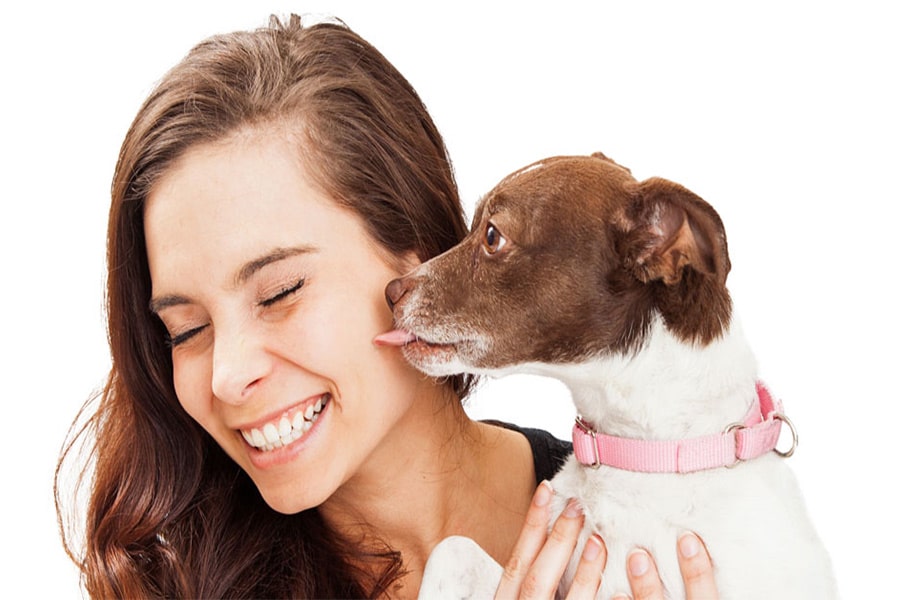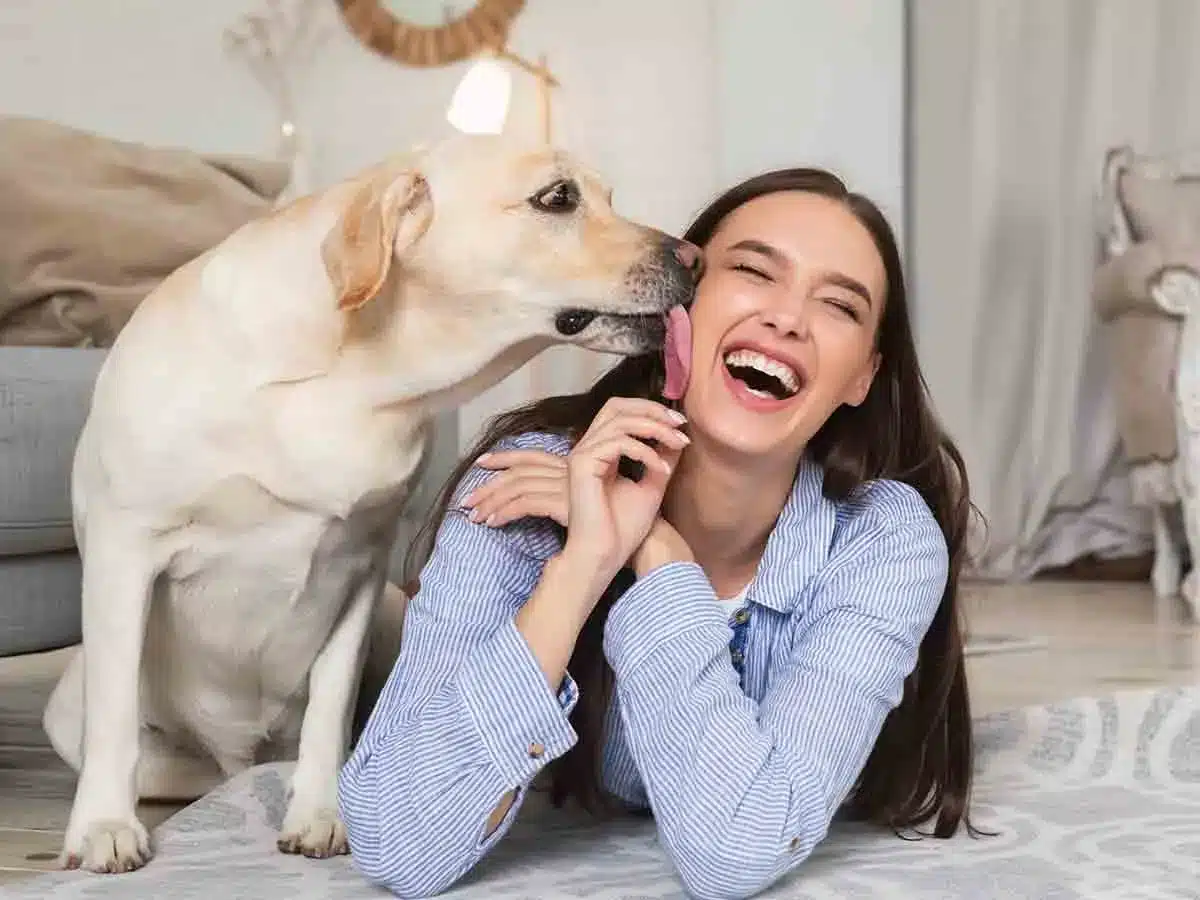In the strong bond between humans and their beloved dogs, exchanging slobbery and wet kisses while petting is a common sight. The intricate world of dog communication showcases the appeal of this behavior.
You can find the answer to the commonly asked question, “Why does my dog lick me when I pet her? by reading this article. We aim to delve into the depths of Why Does My Dog Lick Me When I Pet Her? Decoding Canine Affection: This affectionate gesture and the primal urges that dogs are naturally inclined towards.
We examine all aspects of this charming behavior, including the physical, mental, and practical aspects, by looking at where licking comes from and exploring its various reasons.
So, as you read on, fasten your seatbelt for a heartwarming expedition into the world of puppy kisses. Each lick becomes a narrative of love, connection, and an unspoken understanding that solidifies the unique bond between you and your furry friend.
Understanding the Instinct to Lick: Why Does My Dog Lick Me When I Pet Her?
Dogs’ licking behavior is engrained in their instincts and goes beyond a simple habit. Understanding the licking instinct can help you get insight into the fascinating world of dog behavior.
Dogs have several ways to communicate by nature, and one of their main methods is licking. This urge has its roots in their prehistoric evolutionary history, when licking was necessary for connecting, grooming, and showing affection.
Therefore, the next time your dog gives you a slobbering kiss when you pet them, keep in mind that it’s a charming way for them to connect with you and communicate their thoughts and is a natural behavior deeply ingrained in their DNA.
Reasons Why Dogs Lick:
Why do dogs lick? It’s like they have their own special language, and licking is one way they talk to us. There are a bunch of reasons behind it, and they’re pretty cool!
Showing Affection: Dogs lick as a display of love towards you.
Checking Your Scent: Have you noticed your dog sniffing you often? They lick you to get acquainted with your smell. They say, “Yes, that’s my human!” with this.
Grooming You: Dogs act as miniature groomers. They may lick you to help keep you clean, just as they would for their furry companions.
Making Peace: When dogs lick, it’s often their way of signaling, “Hey, all is well, and I come in peace.” It’s akin to their canine handshake.
Understanding why your furry friend licks you adds an enjoyable dimension to your bond. So, when you receive those wet kisses, remember that your dog is communicating with you in their unique way, showing love, interest, and companionship!
Positive Aspects of Dog Licking:
Dog licking isn’t just a random, slobbery act; it’s filled with positive vibes and plays a role in building a strong connection between you and your furry friend. Let’s dive into the sunny side of doggy kisses:
Positive Aspects of Dog Licking
| Aspect | Description |
|---|---|
| Expressing Affection | When your dog licks you, it’s like they’re giving you a big, wet hug. They’re saying |
| Non-Verbal Communication | Dogs communicate without words, using body language. Licking is their way of expressing feelings – be it joy, happiness, or pure excitement. |
| Creating a Bond | Slobbery kisses aren’t random; they strengthen the bond between you and your dog, like a secret handshake only the two of you share. |
| Comfort and Relaxation | Licking serves as a calming activity for dogs, helping them wind down and feel cozy. They want you to join in on that soothing experience. |
| Grooming and Care | Dogs, natural groomers, may lick you to help keep you clean. It’s their caring way of looking out for their human buddy. |
Negative Aspects and Concerns:
While dog licking can be a harmless display of affection or communication, there are situations where it becomes excessive or problematic. Here’s what to watch out for:
Negative Aspects and Concerns of Dog Licking
| Negative Aspect | Potential Risks | What to Do |
|---|---|---|
| Hygiene | Transfer of germs and bacteria, especially to immunocompromised individuals or young children | Consult your vet about safe levels of interaction. Prioritize good hygiene practices for both yourself and your dog. |
| Skin Irritation | Raw patches, potential infections | Consult your vet to rule out medical causes. Address boredom or anxiety with enrichment activities. Redirect licking and reward alternative behaviors. |
| Destructive Behavior | Damage to furniture or belongings | Identify triggers and avoid them. Redirect licking and teach commands like “leave it” or “enough.” Provide alternative attention and enrichment activities. |
| Underlying Medical Issues | Allergies, pain, digestive issues, neurological problems | Consult your vet immediately for diagnosis and treatment. Follow their recommendations carefully. |
Addressing problem-licking:
While dog licks are often endearing signs of affection, excessive licking can become problematic for various reasons. This guide outlines the potential issues and strategies to help pet owners manage the problem of licking their furry friends:

Identify the cause:
- Hygiene concerns: Consider your dog’s environment and contact with potentially harmful substances. Consult your vet if you have immunocompromised individuals or young children at home.
- Skin irritation: Observe for raw patches, redness, or persistent licking of specific areas. Consult your vet to rule out allergies or other medical causes.
- Boredom or anxiety: Watch for changes in routine, lack of stimulation, or signs of stress. Provide enrichment activities, mental stimulation, and address potential anxiety triggers.
- Attention-seeking behavior: Be mindful of your reactions to licking. Avoid reinforcing unwanted behavior with attention, even negative attention. Use positive reinforcement for calmer interactions.
- Underlying medical issues: Consult your vet promptly if you observe sudden changes in licking behavior or suspect medical causes like allergies, pain, or digestive issues.
Implement management strategies:
- Redirect and reward: Gently redirect your dog’s attention to toys, chews, or activities they enjoy when they start licking excessively. Reward them for focusing on these alternatives.
- Set boundaries: Teach your dog a command like “leave it” or “enough” to discourage unwanted licking. Be consistent and patient with your training.
- Provide enrichment: Address boredom and anxiety by offering stimulating activities like puzzle feeders, scent work, or interactive toys. Ensure daily walks and exercise.
- Hygiene practices: Wash your hands after interacting with your dog, especially before touching your face or young children. Consider wiping your dog’s fur with a damp cloth after outdoor adventures.
Seek professional help.
- Consult your veterinarian to rule out any underlying medical conditions contributing to the licking.
- Consider seeking the guidance of a qualified animal behaviorist if the problem persists and you need help establishing a training plan.
Conclusion:
There you have it—the story of why dogs adore kissing! Their manner of saying, “I really, really like you!” is like this. It’s really pleasant and makes you feel liked most of the time.
Give your dog a nice toy or give them a break from petting if you feel that they are kissing you a bit too much. It is analogous to stating, “Let’s relax for a moment.”
Always make sure your animal friend is comfortable by keeping a watch on them. And what do you know? Speak with the veterinarian if you ever start to worry. They can assist, as they are experts on dogs.
Thus, relish those sloppy kisses, play hard, and keep creating amazing memories with your dog. It’s a joyful tale about your pup.
FAQs
- Why does my dog lick me when I pet them?
- Dogs often lick to show affection. It’s their way of saying, “I like when you pet me!”
- Is it bad if my dog licks a lot?
- Not necessarily, but excessive licking might signal boredom or anxiety. Try providing toys or consulting your vet.
- Can I train my dog to stop licking?
- Yes! Teach commands like “enough” and offer alternatives like chew toys.
- Should I be worried about health issues related to licking?
- Watch for skin irritation or changes in behavior. If concerned, consult your vet for a checkup.
